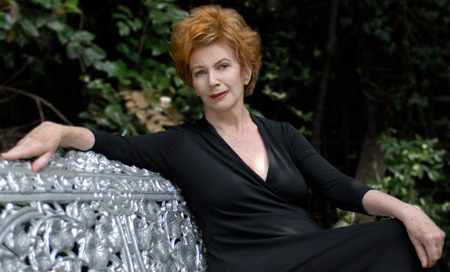The Light of Evening, Edna O’Brien’s most autobiographical novel yet, depicts the struggle between a mother and daughter to sever the unbearable bond — the “blood feud, blood knot, blood memory” — that conjoins them and the love and guilt that makes total separation impossible. O’Brien sets her story in her mother country, Ireland, saturating it with both the poetry and the malarkey of her mother tongue.

HER STORY: O’Brien’s compact stream-of-consciousness is a distillate of Faulkner and Joyce.
|
Dilly Macready, who’s dying in a Dublin hospital, waits for a visit from Eleanora, her estranged and exiled daughter. Sleeping pills send Dilly into a disinhibited dream state. She reels through a vivid recounting of the years she spent in New York working as “a Biddy, a kitchen canary,” and her first love. The chapters are interspersed with plaintive letters from home (one signed “Your broken mother, Bridget”) begging for Dilly’s return and reporting on the misadventures of her “mad Fenian” brother. Her beau’s betrayal finally sends her fleeing back to Ireland.
Dilly marries Con Macready, a racehorse trainer able to spot a mare with just enough talent to place third in any race. He takes her to live in his run-down manse, Rusheen, “the place where her sorrows had multiplied and yet so dear to her.”
The story moves to Eleanora, whose life mirrors O’Brien’s. She runs off with an older man, a famous writer, Hermann, whom her family despises. They marry and raise two sons. Eleanora writes a novel that causes scandal at home and abroad. (O’Brien’s Country Girl trilogy was banned in Ireland because of its explicit sexual content.) Hermann is furious that Eleanora has not allowed him to edit her work.
“You would only tinker with it,” she said fearless, though fearing.
“O pray enlighten me . . . ”
“I wrote ‘It was a country road tarred very blue’ and you deleted it, said there was no such thing as a blue road.”
“There isn’t,” he said savagely.
“There is,” she said savagely back.
That pretty much sums up the relationship.
Eleanora blames literature for her awful marriage. Schooled in love by the Brontës, she expected Hermann, dark and broody as Mr. Rochester, to be tamed into domestic bliss. Instead he interprets her success as a kind of insurgency, first claiming he wrote her books, then leaving her, taking the children with him.
Back in the hospital, Dilly is befriended by Sister Consolata, “daft” according to Nolan, the girl who brings the tea trolley around, “ready to float up at any minute to heaven . . . meet her boyfriend St. Augustine.” Together the nun and Dilly pray, “storm heaven,” for Eleanora’s sinful soul and for her return to her mother’s side. Now it is Dilly who sends beseeching letters to a distant daughter.
Eleanora eventually comes, but her mind is on some feeble romantic intrigue, and she departs in haste, leaving her journal, raw and incriminating, for Dilly to read. “She, the motherless mother, I, the motherless mother. . . . Her eyes a range of blues that could search out the slightest miscreance and then seethe with anger.”
And still Dilly gets up off her deathbed to amend her will, intending to leave Rusheen to Eleanora, but she collapses before she can reach the solicitor’s office.
O’Brien has mastered a compact stream-of-consciousness that seems sometimes like a distillate of her influences; in The Light of Evening there are moments as violently lyrical as Faulkner and more than one outright homage to Joyce. (She even confers Joyce’s perforated ulcer on her fictional father, Con.) She does them proud: “Such is the wrath of the mothers, such is the cry of the mothers, such is the lamentation of the mothers, on and on until the last day, the last bluish tinge, the pismires, the gloaming, and the dying day.”
The Light of Evening | By Edna O’Brien | HoughTon Mifflin | 304 pages | $25
Edna O’Brien | Brookline Booksmith, 279 Harvard St, Brookline | October 19 | 7 pm | 617.566.6660